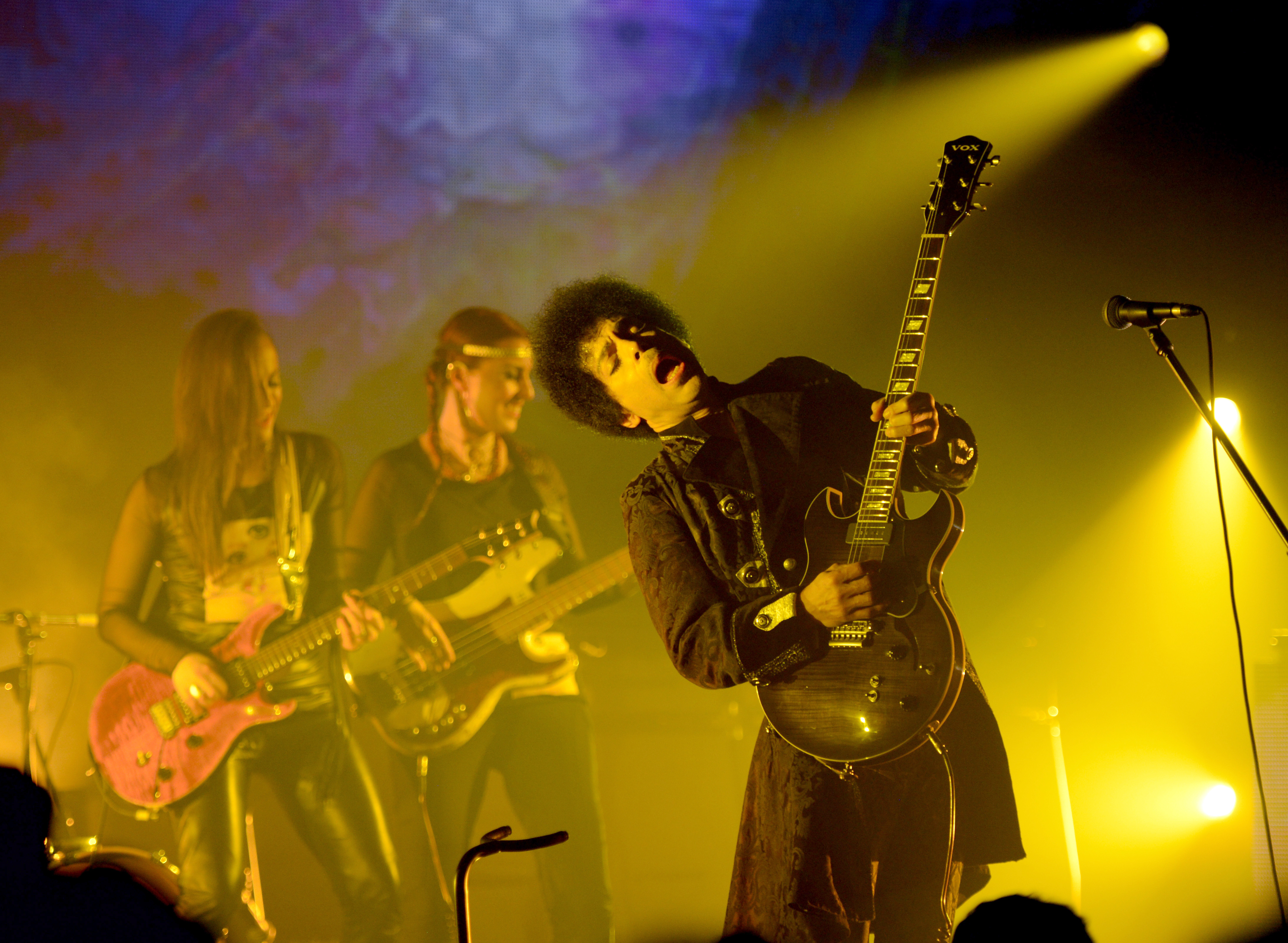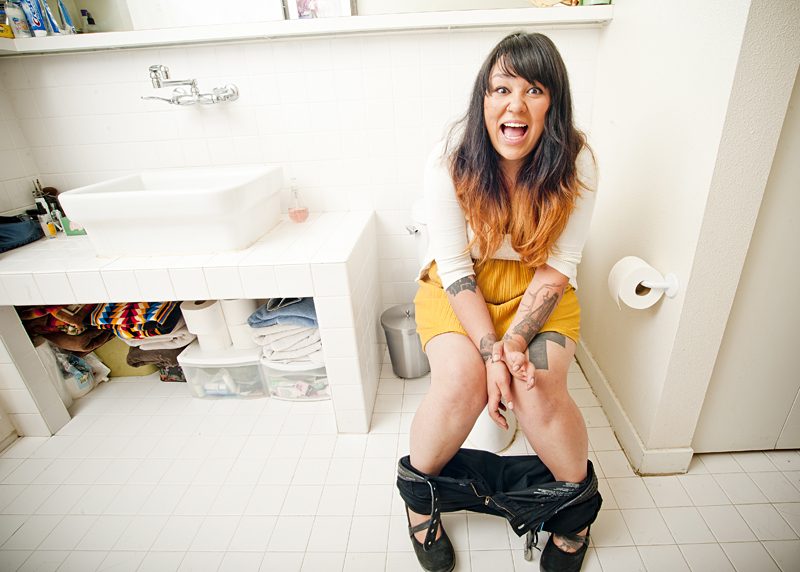Waiting for Prince to take the stage at the Showbox last Thursday evening for the first of four shows in two days, the crowd was buzzing with the kind of anticipation of a shared peak experience normally reserved for natural disasters. Everyone was smiling, antsy. Strangers greeted each other like old friends.
Prince is one of our favorite musicians. No one doesn’t like Prince, he’s too good at too many things. The excitement of seeing Prince in such an intimate venue, of being teased and strung along by an undisputed master, of being made to dance, was public foreplay that had us flush. The Showbox felt like the perfect venue for Prince to do something nasty to us, to start an orgy of 40-somethings, to turn us into slaves.
When Paul Simon played the Showbox two years and one day earlier, the venue’s intimacy provoked an extraordinary performance from the band, vastly transcending its run through the same set list at the much-larger WaMu Theater two nights prior. But while Simon was inspired by the smallness of the space, personally handing us each song wrapped in tissue, Prince overfilled it, misusing the space and relying on our physical proximity to simulate closeness. It worked as a spectacle, but not as a show.
The problems began almost immediately. The mix was haywire: too loud, too much fuzz on the bass, drums too quiet and muffled, guitars over the top of everything like fudge cannons, vocals like broadswords. It was the opposite of intimate.
Prince corralled 1,200 people into an enclosed space and directed the volume and energy of a full stadium show at us, like he was experimenting with a less-humane method of killing livestock: by octave pedal. There was smoke. There were wailing guitar solos upon wailing guitar solos. There was a bass solo. There was a wall of video screens playing what looked like Windows 95 screen savers. And that was just the first song.
The effect was like that of a giant Celebrity cruise ship pulling into a small Caribbean port town and unloading 2,000 tourists for a half-day excursion. From the perspective of those aboard the ship (which is to say, from within Prince’s mind), gaudy volume and epileptic lights seem like normal party fun, but to the people on shore it reads as an invasion of vulgarity. Put another way: We climbed into bed with a very attractive and sexy person and all of a sudden he started making all these sex faces and wolf noises, humping us and shit.
Playing the Showbox was an act of throwing down the gauntlet. Prince was coming home to the clubs to demonstrate something, to show us “how it’s done,” to school us in one of the thousand dark arts that only he has unlocked. But he didn’t take real risks, didn’t challenge himself or us. Instead he hoped to content us with the appearance of risk-taking in the form of a set heavy on new songs, as though failing to satisfy us with “the hits” was a kind of rebellion.
We’re all well-versed by now in the legacy artist who won’t play his hits. It’s not edgy, it’s a trope. We came prepared for it. We expected to see him stretch out, play new jams, go crazy. He had us chanting “I’m your driver, you’re my screw,” as though it scratched our itch just to sing some salacious words he’d written. Prince is the only artist in the world that could get a crowd to sing lyrics that terrible, because we were all thinking, “What’s he up to? What subtext am I not getting?” There was none. Even Madonna would have been embarrassed.
After the show I had many questions, so I waited for the crowd to clear and examined the stage, thinking maybe I would find evidence of too much modern “tech” guitar gear that would explain the weird cut-and-paste mix. But the vintage effects pedals and amps were above the haughtiest reproach.
I talked to the Showbox tech guys, the Blackjeans and Maglights: Did they think the sound was wack? No way! Everybody loved it! Turns out Prince mixed the show himself. He literally ran the soundboard during soundcheck and made all the mixing decisions personally.
I asked my friends—people who’ve seen 10,000 rock concerts, people who know the room and know live sound—what they thought. They loved it too.
Was I crazy? I needed to see it again. Maybe I was too burdened by my own aesthetic, by an unrealistic desire to see Prince play a simple rock show—just some great musicians and their instruments, no smoke machines, no Christmas lights, no Guitar Center video presentation. Of course he had over-the-top production and sound. That’s what the man does. I needed to see it again.
I returned to the Showbox on Friday night for the last of his four shows, fully prepared for what Prince wanted to give me, rather than what I wanted from Prince. The second show was better, more polished, more up-tempo, but suffered from all the same problems of sound and conception. The band was great, proficient in every aspect of jazz, rock, and funk, but the show was a bombastic slog.
Prince’s showmanship has always redeemed him, even when indulging a vanity unmatched by despots, because his creativity was the bedrock. But without creativity, showmanship and vanity are mundane. A telling moment in the second show encapsulated this decline. Prince is one of those guitarists who, in the middle of a fiery guitar solo, will reach up and make micro-adjustments to one of his tuning pegs. It’s a good bit of rock theater that played out multiple times during both shows. I have no doubt that his ear is refined enough to hear tuning vagaries that need immediate adjustment, and I thought it a suave move every time. But at one point Friday night, he strutted over to his bassist—one of my favorite musicians I’ve seen in the past year—and made a micro-adjustment to her A string. I just about jumped out of my clothes.
This is a bold move of James Brown–level audacity. You don’t touch a musician’s instrument in the middle of a song. Not only did Prince do it, he got it wrong. He pulled the A string a little sharp. It’s not a disaster. It’s just a hair sharp. But she had a smile on her face that could cook an egg. She made no attempt to avoid the string. She just played sharp, as if to say “O.K., motherfucker, if that’s where you want it.”
Prince micromanaged every aspect of his show. There’s no reason to think that he didn’t personally film the background videos of spinning guitars and silhouettes of girls dancing that made me feel like I was at an Art Institute freshman orientation. He clearly wanted his guitars to sound like slugs farting in shaving cream for half the show. For all his genius, all his unmistakable talent, Prince needs an editor. His fans will pay $250 to watch him peel onions—that much is clear—but he’s too gifted an artist to coast like this. To play small clubs, he needs to step out of his echo chamber and show us something special. music@seattleweekly.com
John Roderick is the singer and songwriter responsible for the Long Winters. He tweets @johnroderick.







